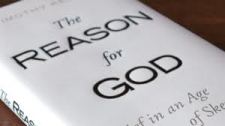 I had a discussion with Dr. Craig in a note I posted on Facebook, but I am deleting Facebook Sunday and the discussion was never resolved, so I am moving it to here. Hopefully he can reply here or in one of his weekly Q&A on his Reasonable Faith site.
I had a discussion with Dr. Craig in a note I posted on Facebook, but I am deleting Facebook Sunday and the discussion was never resolved, so I am moving it to here. Hopefully he can reply here or in one of his weekly Q&A on his Reasonable Faith site.***
Dr. Craig,
In “Question of the Week #222: Why Is God the Foundation of Moral Values?” you said, “these qualities are good because they are found in God’s nature.” Doesn’t that commit the is-ought fallacy? I was wondering if I could get some feedback on a resolution to this I’ve been chewing on for years (since roughly 2007). There are two issues here. 1) Whether or not there ‘is’ moral truth, and to what it might correspond (metaphysical/ontological), 2) What we truly ‘ought’ to do, and how we justify that (epistemological/justification). God’s nature grounds the first option (“is”), but can not ground the second (“ought”) (Hume’s is-ought fallacy). And if we have justification for the second (“ought”), that does not necessarily mean we’ve satisfied the first (“is”) (antirealism/postmodernism) (reverse is-ought). So–we must have both, independently–Plato’s “Justified-True-Belief” requirement for knowledge (including moral knowledge) (I answer Gettier elsewhere if you’d like to examine that and offer feedback see the first link below). The Euthyphro Dilemma and Hume’s is-ought fallacy are basically saying the same thing, and apply to moral knowledge as much as they apply to other knowledge: a (moral) belief is not true because it is justified, and it isn’t justified because it is true. So the good cannot be justified by its corresponding to God’s nature, for that commits the is-ought fallacy and does not escape the Euthyphro Dilemma. Instead, we must use reasons to show that the good is justified. Still, reasons alone do not show that there is a ‘real’ good–there must exist a being to which it may correspond (God). No God, no ‘true/correspondent’ good. No plants, no ‘true/correspondent’ formula for photosynthesis. So–how do we use reasons to show that the good is justified? We consider the questions that all the theories on-offer are considering, we rule out any inconsistent theories, and we see the theory/answer with which we are left (I believe that is where plausibility can then come in). I believe that most-plausible theory is the Golden Rule (self=Other) as demonstrated by Christ in switching perspectives with us on the cross. I discuss the common questions and inconsistencies of other theories, et cetera, elsewhere and would love for you to offer feedback on my thinking if you would like to examine the link below (2) which is a bit of a nutshell-version (still pretty rough). I hope you are doing well and I’ll end this here. Oh, also, I have other questions in the third link below.
Respectfully,
Maryann/Ichthus77
(1) http://ichthus77.blogspot.com/2011/01/answering-gettier.html
(3) http://ichthus77.blogspot.com/2011/04/questions-regarding-first-chapter-of.html
Saturday, August 6, 2011 at 3:06pm
***

William Lane Craig: Take a look at QoW #165 for my take on this, Maryann.
August 7, 2011 at 5:18pm
Maryann Spikes:










August 6, 2011 at 3:58pm
Maryann Spikes:
Thankyou so much for referring me to that question. I looked it up here: http://www.reasonablefaith.org/site/News2?page=NewsArticle&id=8215 If you feel you are ‘really’ deriving an ‘ought’ from an ‘is’ (at first you say you do, and then you say you don’t) how can you consistently call others on it, like in your debate with Sam Harris? But, I don’t think you really are committing that fallacy (although, I think you did in QoW 222, when you said “are good because” instead of “exist, as”)–since we both agree (myself above, yourself in QoW #165) that there is a distinction between “justification” and “ontological foundation”. I agree with you when you say in QoW 165 that it is wrong to say “because God is a certain way we ought to behave in certain ways.” You are right, and it is wrong, because it commits the is-ought fallacy. But then you go on to say “our moral obligations and prohibitions arise as a result of God’s commands to us.” If God’s commands are not in accordance with his nature, then your statement amounts to voluntarism–to God making things up arbitrarily. So, our moral obligations and prohibitions, if God is not just making things up, are in accordance with his nature–but are not “justified by” the mere fact of his nature, for that would commit the is-ought fallacy, no?
This arises because you do not in your mind connect “these qualities” with “moral obligations and prohibitions”. In #165 and elsewhere (On Gaurd, Reasonable Faith), you do not equate moral goodness with the purpose of the universe, and you do not equate our hunger for meaning with our sense of obligation…these things are actually equivalent. On the cross, when Christ switched perspectives with us to show us God loves us as himself (imputing his own righteousness on whomever accepts it), Christ was demonstrating both ‘ultimate goodness’ and ‘utlimate meaning’ (that which satisfies our hunger for true meaning)–the Golden Rule (self=Other), which corresponds to (describes) his nature, though is not justified by it (is-ought fallacy). See above for the justification part. I am hoping this is received well, this is kind of freaking me out. I’m so honored that you have read and responded to my note. Blessings. :)